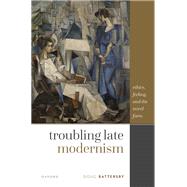Troubling Late Modernism Ethics, Feeling, and the Novel Form
, by Battersby, Doug- ISBN: 9780192863331 | 0192863339
- Cover: Hardcover
- Copyright: 1/27/2023
In the late nineteenth and early twentieth centuries, modernist writers developed new techniques for depicting characters' thoughts, feelings, and desires that revolutionized the novel form--a revolution novelists and critics are still reckoning with today. Troubling Late Modernism tracks how those techniques have been perversely reinvented by some of the most influential and innovative writers of the postwar period. Chapters on Vladimir Nabokov, Samuel Beckett, Toni Morrison, John Banville, J. M. Coetzee, and Eimear McBride reveal how these writers at once exploit and extend modernist forms of narration to cultivate disquieting affective attachments to protagonists compelled by violent or exploitative sexual desires. By interrogating the expressive power and ethical liabilities of modes of writing that give us intimate access to characters' inner lives, late modernism poses fundamental philosophical questions about emotion and its inseparability from knowledge and ethical deliberation. Whilst other historians of the novel have characterized late modernism's formal innovations as ethically and politically edifying, Troubling Late Modernism highlights their more disquieting potential for lending sympathy and profundity to sentiments deemed inadmissible in our everyday lives.
Charting late modernism's characteristic fusion of aesthetic difficulty with emotional and ethical provocation demands an approach attuned to the experience of reading these disturbingly erotic narratives. In dialogue with recent debates about critical method, Troubling Late Modernism presents a new way of closely reading prose fiction that brings together the lessons of formalism and affect theory.
Charting late modernism's characteristic fusion of aesthetic difficulty with emotional and ethical provocation demands an approach attuned to the experience of reading these disturbingly erotic narratives. In dialogue with recent debates about critical method, Troubling Late Modernism presents a new way of closely reading prose fiction that brings together the lessons of formalism and affect theory.







